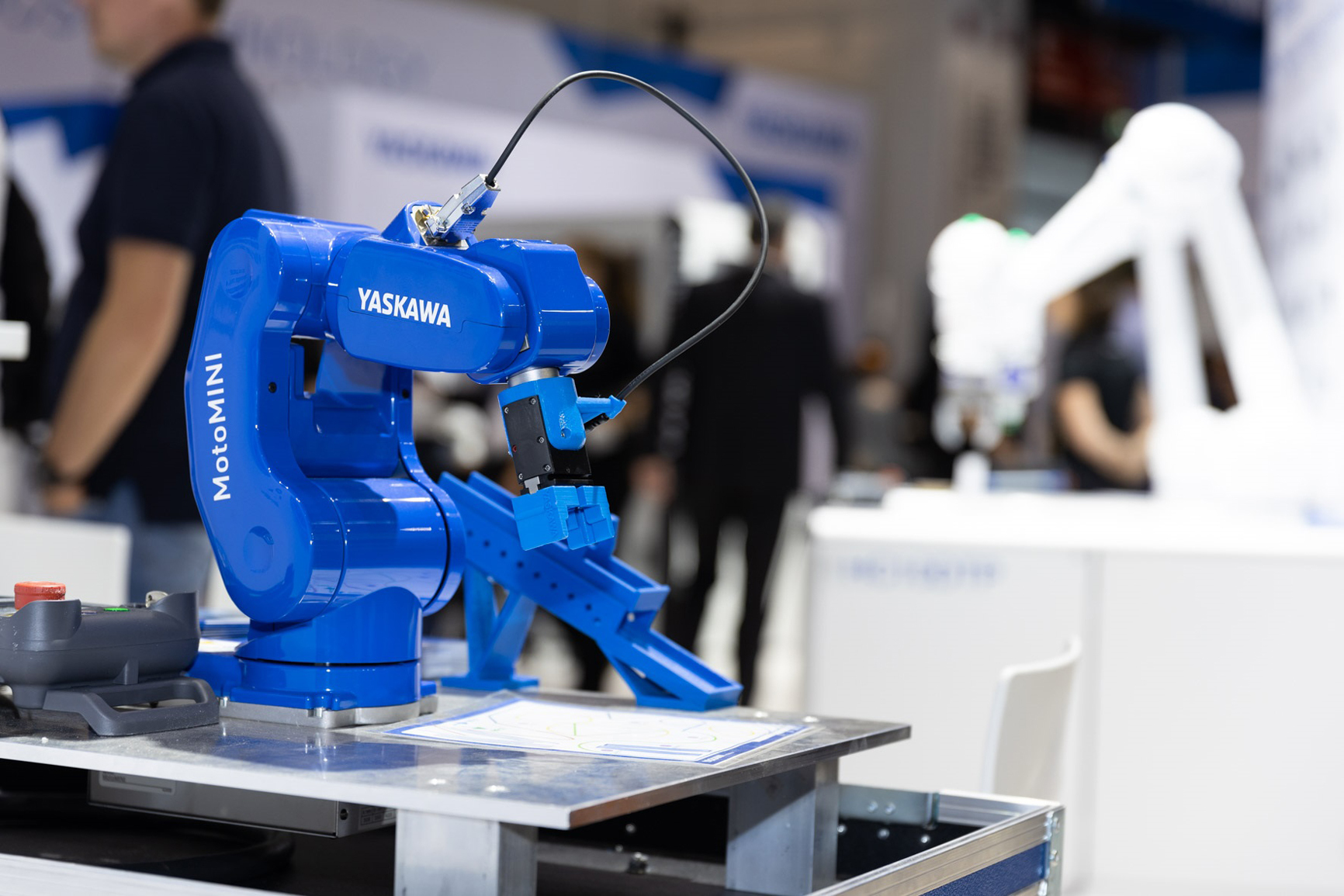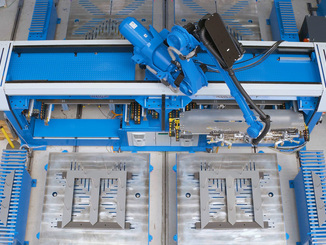
The Reconfigurable Robotics Lab (RRL) at EPFL is conducting research into the development of novel robotic systems such as soft and origami robots – now with the support of a Yaskawa Cobot HC10. The robot was officially handed over on May 28.
They consist of triangular or polygonal modules, can be assembled into a wide variety of shapes and move in all directions. “Our robots are inspired by the Japanese art of paper folding. That’s why we call them ‘reconfigurable origami robots’,” explains Alexander Schüßler, PhD student at the Reconfigurable Robotics Lab (RRL) at EPFL. The lab’s research is dedicated to inventing interactive robotic systems with novel manufacturing techniques and integration processes that push the boundaries of mechanical properties. These efforts are enabling the development of soft, reconfigurable and interactive robots that are highly aware of the environment and are expected to have extensive applications in wearable technology, medical/rehabilitation systems and personal robots.
Cobot or robot – depending on requirements
The RRL at the EPF Lausanne has been in existence for twelve years. The team is made up of scientists from a wide range of disciplines. They have access to a wide range of tools and equipment for their research. However, the lab has so far lacked an industrial robot. “That sounds a bit unusual for a robotics laboratory,” confirms Alexander Schüßler. Particularly precise and high-quality work were key criteria in the selection process: The use of the new “scientific assistant” in experiments makes the results repeatable and reproducible and the data more reliable. Since May 28, 2024, a Yaskawa Cobot HC10 has been supporting the team in its research. The 6-axis robot with a payload capacity of 10 kg and an absolute reach of 1,379 mm (effective reach 1,200 mm) is a cobot, a collaborative robot, and is therefore suitable for fenceless operation and simple and safe collaboration between humans and robots. Depending on requirements, the HC10 can also be used as a high-quality industrial robot with safely monitored operation and full power and speed.
Impressive precision and speed
“The precision of the industrial robot is impressive,” says a delighted Alexander Schüßler. “We are researchers and therefore used to our robots being full of challenges – normally we are busy solving problems and getting to grips with malfunctions. The HC10 is completely different: even the installation was very easy. Now we can just switch it on and it performs all movements with the highest precision and quality.” The HC10 is currently used primarily for force measurements and to collect data on the behavior of the reconfigurable robots during fast movements. “Precision and speed were very important requirements for us, and we only found these fulfilled by Yaskawa. Yaskawa’s Swiss partner SwissDrives AG also provided us with excellent advice and assisted us with the technical implementation,” explains Alexander Schüßler. It is important for SwissDrives to sustainably expand its market share throughout Switzerland, as Yaskawa’s portfolio, together with its comprehensive application know-how, offers every customer real added value.
ROS 2 as a common platform for cobots, reconfigurable robots and sensors
The researchers connect the cobot controller and the controller of the reconfigurable robots via the Robot Operating System ROS 2, a flexible and modular open source software platform supported by Yaskawa. Other sensors can also be connected to ROS 2, for example for pressure or infrared. “For example, we can collect data on human-robot interactions, even if they are not both in the same place – so-called ‘remote human interaction’,” explains Schüßler. Prof. Jamie Paik, Associate Professor at the RRL, is also delighted with her new “research assistant”: “Thanks to the HC10, the researchers not only obtain much more data in their experiments, but they are also more accurate. “In research, reproducibility, repetition and consistency are very important for scientific work,” explains Jamie Paik. And she dares to look ahead: “The cobot enables us to conduct new types of experiments today – but in the future it may also open up possibilities and fields of experimentation that we are not even thinking about today.” Bruno Schnekenburger, Managing Director of Yaskawa Europe GmbH, emphasizes: “Supporting educational and research institutions has been a matter of course for us for years. Yaskawa’s mission is to make our lives easier with its technology and to make a contribution to the future. This is why Yaskawa also supports the ROS-2 interface, which is primarily used in the university and research environment.”
The Reconfigurable Robotics Lab (RRL) at EPF Lausanne
The RRL (https://www.epfl.ch/labs/rrl/) conducts research into the design, drive technology, manufacture and control of interactive robotic systems that overcome the limitations of traditional robotic systems. These include innovative robot concepts such as origami and soft robots, new drive and sensor technologies as well as modeling and control.
With around 12,000 students and doctoral students from over 120 countries and more than 370 laboratories, EPF Lausanne (École Polytechnique Fédérale de Lausanne, EPFL (https://www.epfl.ch/de/) is one of the most important technical and scientific universities in Switzerland and is active in areas such as renewable energies, medical technology, neurotechnology, materials science and information technology.
Web: www.yaskawa.de




